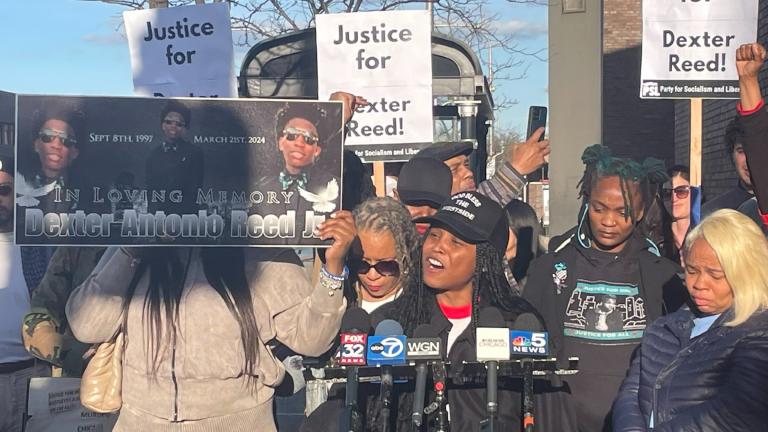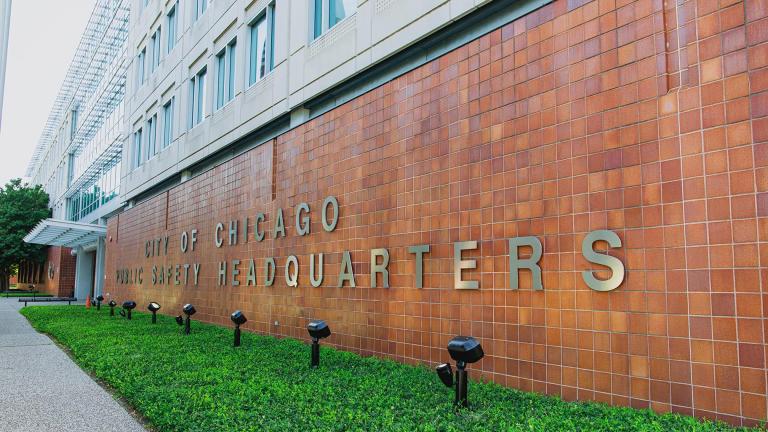 (WTTW News)
(WTTW News)
Aldermen and Mayor Lori Lightfoot have agreed to create a database of Chicago Police Department misconduct files dating back to 2000, an effort championed by Inspector General Joseph Ferguson as a way to start restoring Chicagoans’ trust in officers, Ald. Scott Waguespack (32nd Ward) told WTTW News on Tuesday afternoon.
The database would include both sustained and dismissed complaints, all of which are already public records and can be obtained by making a Freedom of Information Act request. However, that process can be cumbersome, confusing and rife with delays.
“This is a common-sense step toward government accountability,” said Waguespack, who authored the measure with Public Safety Committee Chair Ald. Chris Taliaferro (29th Ward).
Lightfoot said on April 15 that the database was not worth spending “literally tens of millions of dollars” to create. However, the inspector general told aldermen the database would cost $709,501 in 2022 and eventually would be managed by the inspector general’s existing staff at a nominal cost.
An angry Ferguson told aldermen April 16 that the city was at a critical crossroads in the push to restore pubic confidence in the Chicago Police Department and trust in officers after a series of high-profile scandals and police shootings, including the one that resulted in the death of 13-year-old Adam Toledo.
“We are out of runway with respect to the public’s patience and beliefs that we care to reform,” Ferguson said. “Transparency is about the only thing we have available to us. The costs here are incalculable and enormous.”
Originally, the inspector general proposed that the database include all complaints dating back to 1994. However, that date was changed to 2000 as part of the compromise that appears to have paved the way for a vote by a joint session of the Finance and Public Safety committees on May 24.
In addition, the database will exclude any complaints involving domestic violence or child abuse in an effort to avoid compromising the privacy rights of potential victims whose identities should be shielded, officials said.
If endorsed by aldermen on May 24, a final vote on the measure is likely on May 26.
The ordinance directs the inspector general’s office, which will maintain the database, to add additional years of complaint files as quickly as possible once the database is launched.
The database will detail the incident that prompted the complaint, the names of the officers involved and the conclusions of the Civilian Office of Police Accountability or the department’s Bureau of Internal Affairs, or whichever agency probed the allegation of misconduct.
Originally, the inspector general proposed that the database contain the entire case file, including supporting documents. However, the revised measure would just include the summary of the complaint as well as the CR number — making it relatively straightforward to use the Freedom of Information Act to get additional records, officials said.
Independent journalist Jamie Kalven sued the city to force the release of misconduct complaints, and in 2014 won an appellate court victory ensuring that the records are available to the public. To make those records accessible, Kalven’s Invisible Institute compiled its own repository, the Citizens Police Data Project, as part of its effort to hold police officers accountable for misconduct.
Kalven told aldermen that a city-run database would represent a “paradigm shift” in how the city discloses complaints against officers and “significantly reduce demands” on city staff charged with providing documents via the Freedom of Information Act.
The database also has the support of Charles Green, who sued the city to force officials to turn over nearly five decades’ worth of secret files detailing allegations of misconduct by officers, said Jared Kosoglad, Green’s attorney.
Green was sentenced to life in prison at age 16 after being convicted in a 1985 quadruple murder. Green was released from prison in 2009 after serving 24 years. A judge released him after re-sentencing him to 40 years in prison and determining that he had already served enough time. His conviction was not overturned.
In January, Judge Alison Conlon found that police and city officials had “willfully and intentionally failed to comply” with the Freedom of Information Act in Green’s case and ordered the city to turn over the files.
First Assistant Corporation Counsel Renai Rodney told aldermen in January 2020 that it would cost the city $8 million and take 10 years to release all of those files and comply with the judge’s order.
Since then, an Illinois appellate court overturned part of Conlon’s ruling, saying she only had jurisdiction over complaint files dating back to 2011.
Contact Heather Cherone: @HeatherCherone | (773) 569-1863 | [email protected]








